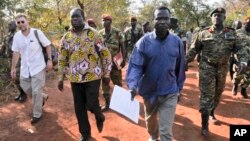In Uganda, the surrender of senior LRA commander Dominic Ongwen earlier this month has become a divisive issue. The notorious rebel - who will now face war crimes charges at the International Criminal Court in The Hague - was himself abducted and abused by the Lord’s Resistance Army when he was just a child. Ugandans are wrestling with the issue of what is justice when the abused becomes the abuser.
Dominic Ongwen was only 10 years old when, while walking to school, he was abducted by the Lord’s Resistance Army - which has terrorized Uganda and its neighbors for decades and is infamous for forcing tens of thousands of children to become soldiers or sexual slaves.
Under the threat of death, Ongwen was forced to abuse, kill and take part in mass atrocities alongside his military commanders. By the time he was 18, Ongwen had reportedly earned a fearsome reputation in the terrorist group. As an adult, he made his way into the inner circle surrounding LRA leader Joseph Kony.
In 2005, while investigating war crimes in northern Uganda, the ICC issued an arrest warrant for Ongwen, citing crimes against humanity.
A decade later and nearly a quarter of a century after his abduction - Ongwen walked out of the bush January 6, surrendered and ignited a debate in his home country.
Because of Ongwen's unique status as a victim and perpetrator, the case against him is shining a spotlight on the ideas of justice, forgiveness and reconciliation.
In Uganda, opinion divides geographically. For many in southern Uganda, Dominic Ongwen is an enemy of the state who should be tried for his crimes in Uganda and perhaps even executed.
But for many northerners, despite being brutally targeted by the LRA, very few child soldiers are seen as wholly responsible for the crimes they committed.
Joseph Ogama who grew up amidst the conflict in northern Uganda explained the mentality behind this forgiveness.
"For sure, they are doing that because of their other elders who went away long long time ago, they are still into the bush. And now they are asking for them to come back so that they can forgive everyone is because of one thing. They have to develop as Acholi, as Luo, as everyone into Uganda. And that is the reason why right now they are forgiving everyone. Because they know that if they are to come home, they would settle their family and at least think, and at least build, and at least create more and more for their own generation like an Acholi," he said.
Ugandan legal experts like Nicholas Opiyo contended Ongwen's status as a child soldier did not, and should not, exempt him from being held responsible for his crimes.
“And that moral argument is an argument that is being made by people in northern Uganda . Religious leaders and people like that. That moral argument is that look, this is a child who found himself in rebellion because of the failure of the state to protect him in the first place. That for me is a moral argument. If you place that moral argument within the legal argument, that can only work, not in defense, but in mitigation for any punishment he might receive from the court. Because the culpability of when, cannot be extinguished by the fact that he was a child soldier," he said.
Opiyo argued justice would be best served by the ICC rather than an Ugandan court. But Uganda has a contentious relationship with the international court.
In December, President Yoweri Museveni called on the African Union to pull out of the ICC, calling it biased against African leaders. When Ongwen surrendered, the government changed its view and allowed the ICC to take custody of Ongwen.
Government officials said the international nature of Ongwen's crimes required international jurisdiction.
Senior adviser to the Coalition for the International Criminal Court Stephen Lamony said he thought Ongwen should be tried by the ICC, but Uganda had jurisdiction to keep him.
"Dominic Ongwen is accused of having committing crimes in Uganda only. That regional dimension as far as the charges that have been brought against him does not really arise ... What I did listen to the reason given by [Foreign] Minister Okello Oryem explaining the reason why they had to hand over Dominic Ongwen to the ICC, and he alluded to the issue that Dominic Ongwen had committed crimes in other regions, so it was difficult for Uganda to try him in Uganda only. But of course if you look at the ICC charges, they relate to the situation of Uganda where he committed these crimes and not the other countries where he has been operating," he said.
Despite its critics, legal experts suggest the ICC can accomplish more than Uganda, most importantly allowing LRA victims to finally be heard.




